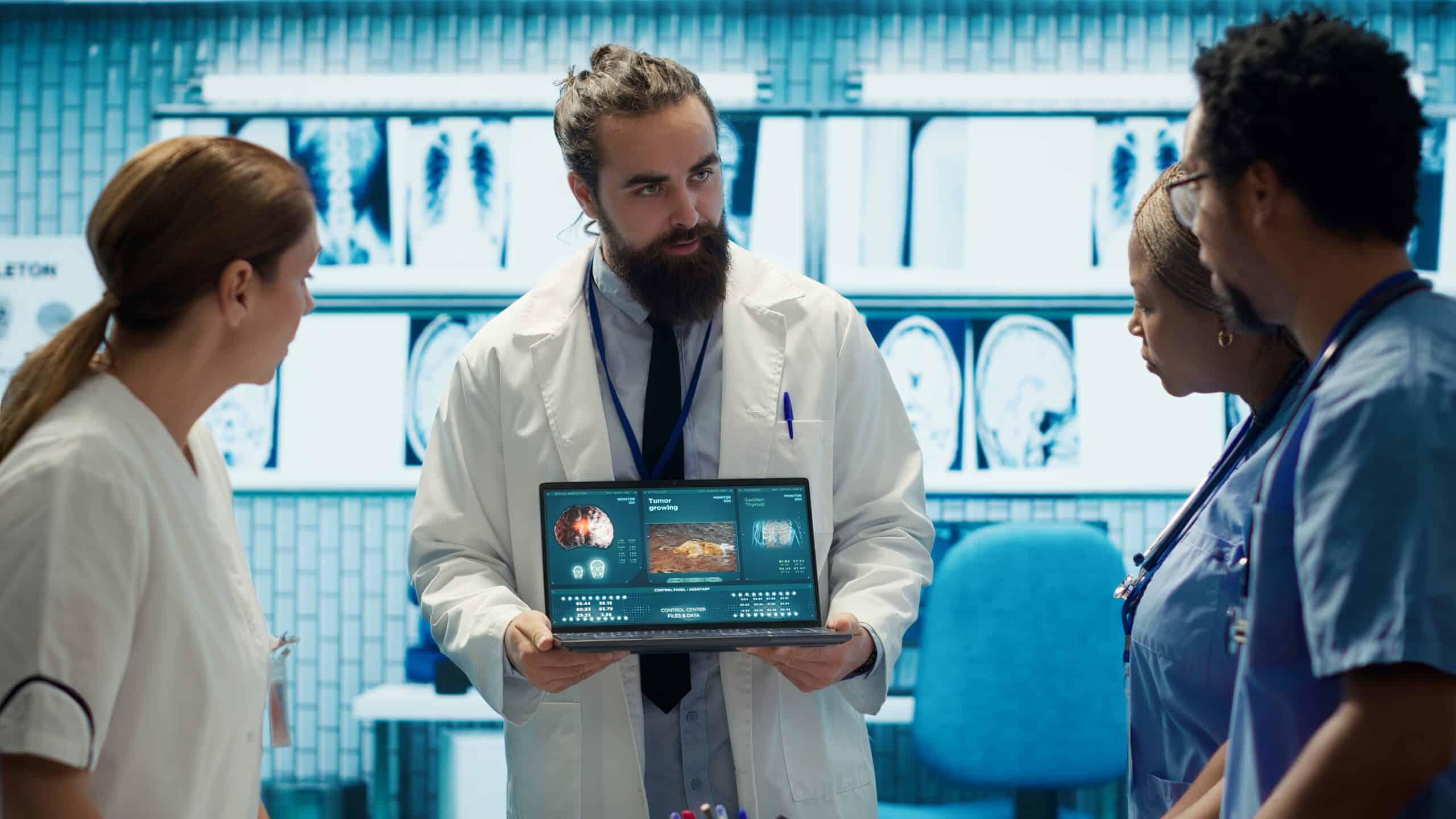The expanding Gen AI use cases in healthcare demonstrate a solid potential to address complex medical challenges. That too, while improving patient outcomes across diverse clinical settings.
Generative artificial intelligence represents a revolutionary advancement in healthcare technology. It is fundamentally transforming how medical professionals diagnose, treat, and care for patients.
Gen AI use cases in healthcare extend beyond traditional applications. As healthcare systems worldwide grapple with increasing demands and resource constraints, generative AI emerges as a powerful tool.
Moreover, it is essentially capable of enhancing efficiency, accuracy, and accessibility in medical care. The transformative potential of generative AI in healthcare stems from its ability to create new content, insights, and solutions based on existing medical data and knowledge.
Unlike conventional healthcare technologies, generative AI can produce original diagnostic interpretations, treatment recommendations, and even synthetic medical data for research purposes.

Understanding Generative AI in Healthcare
Gen AI use cases in healthcare represent a sophisticated approach to artificial intelligence. It is capable of creating new content and insights rather than simply analyzing existing data.
This technology leverages advanced machine learning algorithms to generate novel solutions and recommendations.
The fundamental difference between Gen AI use cases in healthcare and traditional AI lies in their operational capabilities and output generation.
While traditional AI systems excel at pattern recognition and classification tasks, generative AI can create entirely new content. It further includes medical images, treatment protocols, and diagnostic reports.
The underlying technologies enabling Gen AI use cases in healthcare include large language models, neural networks, and deep learning architectures. These are specifically designed for medical applications.
Furthermore, the integration of natural language processing capabilities allows generative AI to interpret and generate human-readable clinical documentation with AI. Thus, making it accessible to healthcare providers across various specialties.
Key Use Cases of Generative AI in Healthcare
The diverse Gen AI use cases in healthcare span multiple medical disciplines and administrative functions. This ultimately offers comprehensive solutions to address various healthcare challenges.
These applications demonstrate the versatility and potential impact of generative AI across the entire healthcare ecosystem.
Exploring the various Gen AI use cases in healthcare reveals remarkable opportunities for innovation and improvement across patient care, medical research, and operational efficiency.
1. Medical Imaging Enhancement
Medical imaging enhancement represents one of the most impactful Gen AI use cases in healthcare, revolutionizing how clinicians interpret and utilize diagnostic images.
Generative AI algorithms can enhance medical image resolution and clarity. It ultimately provides healthcare professionals with superior visual information for accurate diagnostics.
Subsequently, these enhanced images enable more precise identification of abnormalities, tumors, and other medical conditions that might be difficult to detect in standard imaging.
According to a 2024 study published in Nature Medicine:
- Analysis of 83 studies revealed an overall diagnostic accuracy of 52.1% for validating generative AI models for diagnostic tasks published between June 2018 and June 2024.
Furthermore, generative AI can create synthetic medical images for training purposes. They can address the challenge of limited medical imaging datasets for educational and research applications.
These synthetic images maintain the essential characteristics of real medical images while protecting patient privacy and confidentiality.
2. Drug Discovery and Development
Drug discovery acceleration through generative AI represents a groundbreaking advancement in pharmaceutical research. Furthermore, they reduce the time and cost associated with bringing new medications to market.
This application exemplifies how Gen AI use cases in healthcare can transform entire industries. Generative AI algorithms can predict and create novel drug compounds by analyzing molecular structures and their potential interactions with biological targets.
Additionally, these systems can simulate countless molecular combinations to identify promising candidates for further development.
Moreover, generative AI can predict molecular behaviors and optimize drug efficacy. They achieve this by simulating how potential medications interact with specific biological pathways.
Therefore, pharmaceutical companies can allocate their research and development budgets more efficiently. This is possible while increasing the likelihood of successful drug approvals.
3. Personalized Medicine
Personalized medicine represents one of the most promising Gen AI use cases in healthcare. Furthermore, it enables tailored treatment approaches based on individual patient characteristics, genetic profiles, and clinical histories.
This application transforms the traditional one-size-fits-all approach to medical care.
Generative AI systems can analyze vast amounts of patient data. Similarly, this includes genetic information, medical history, and lifestyle factors, to create personalized treatment plans.
A 2024 study by ResearchGate found that AI-driven personalized treatments improved patient outcomes by 35% compared to standard treatment protocols. Thereby highlighting the effectiveness of Gen AI use cases in healthcare.
This predictive capability allows healthcare providers to intervene early in disease processes. Moreover, this can potentially prevent serious complications and reduce overall healthcare costs.
Consequently, personalized medicine powered by generative AI represents a shift toward more effective healthcare delivery.
4. Virtual Patient Simulations
Virtual patient simulations powered by generative AI create realistic training environments for medical professionals. Additionally, they address the need for safe, controlled learning experiences.
These Gen AI use cases in healthcare revolutionize medical education and professional development. Generative AI can create highly realistic patient scenarios that simulate various medical conditions, symptoms, and treatment responses.
According to the Association of American Medical Colleges’ 2024 report:
- Medical schools using AI-powered virtual patient simulations reported a 45% improvement in student clinical skills assessment scores.
Moreover, these simulations enable healthcare professionals to practice complex procedures repeatedly until they achieve proficiency. This reduces the learning curve associated with new techniques and technologies.
The virtual environment allows for immediate feedback and performance assessment, ultimately accelerating the learning process and improving overall competency levels.
Therefore, virtual patient simulations represent a cost-effective approach to medical education and development in Gen AI use cases in healthcare.
5. Clinical Decision Support
Clinical decision support systems enhanced by generative AI provide healthcare professionals with evidence-based recommendations.
Moreover, this improves diagnostic accuracy and treatment decisions. These Gen AI use cases in healthcare serve as intelligent assistants for medical practitioners.
Generative AI algorithms can analyze patient data and medical literature to provide real-time recommendations for diagnosis and treatment.
The American Medical Association’s 2024 survey found that 2 in 3 physicians are using health AI, which is up 78% from 2023.
Furthermore, these systems continuously learn from new medical research and clinical outcomes. This ensures that recommendations remain current and evidence-based.
This capacity enables clinical decision systems to evolve with advancing medical knowledge and changing treatment protocols in Gen AI use cases in healthcare.
- Administrative Automation
Administrative automation in healthcare through generative AI addresses the burden of paperwork in healthcare settings. These Gen AI use cases in healthcare streamline operational efficiency across healthcare organizations.
Generative AI can automate complex administrative tasks such as medical coding, documentation, and billing processes.
Additionally, these systems can generate comprehensive patient reports, discharge summaries, and insurance documentation with minimal human intervention.
Moreover, automated systems can handle routine correspondence, appointment scheduling, and insurance verification processes. This will ultimately free up staff time for more complex tasks that require human expertise.
These efficiency gains translate into improved patient satisfaction and reduced operational costs for healthcare organizations. Therefore, administrative automation represents a practical and immediately beneficial application of generative AI in healthcare settings.
7. Virtual Health Assistants
Virtual health assistants powered by generative AI provide 24/7 patient support and engagement, extending healthcare services beyond traditional clinical settings.
These Gen AI use cases in healthcare enhance patient access to medical information and support services.
AI-powered chatbots and virtual assistants can answer patient questions, provide medication reminders, and offer general health guidance around the clock.
Furthermore, virtual health assistants can assist with appointment scheduling, prescription refills, and care plan management, providing patients with convenient access to healthcare services.
These systems can also provide personalized health education and lifestyle recommendations based on individual patient profiles and health goals.
Consequently, virtual health assistants serve as valuable extensions of healthcare teams, improving patient engagement and adherence to treatment plans.
8. Remote Patient Monitoring
Remote patient monitoring enhanced by generative AI enables continuous health tracking and early intervention, particularly valuable for managing chronic conditions and post-acute care.
These Gen AI use cases in healthcare extend clinical oversight beyond traditional healthcare settings.
Generative AI algorithms can analyze data from wearable devices, home monitoring equipment, and patient-reported symptoms to identify concerning patterns or trends.
Additionally, Gen AI use cases in healthcare can predict potential health complications before they become critical.
And due to the same, this enables timely interventions that prevent hospitalizations and emergency department visits.
Moreover, remote monitoring systems can automatically adjust care plans based on real-time patient data, ensuring that treatment remains optimized for the current health status.
This adaptive approach enables more responsive and personalized care management, particularly beneficial for patients with complex or fluctuating health conditions.
9. Predictive Analytics
Predictive analytics powered by generative AI enables healthcare organizations to forecast certain parameters. These include patient outcomes, resource needs, and potential health risks, supporting proactive care planning and resource allocation.
These Gen AI use cases in healthcare transform reactive healthcare into preventive medicine.
Advanced AI algorithms can analyze historical patient data, population health trends, and environmental factors to predict individual and community health outcomes.
Subsequently, these predictions enable healthcare providers to implement preventive interventions and allocate resources more effectively.
Healthcare organizations can identify high-risk patients and implement targeted interventions to prevent complications and improve outcomes.
Furthermore, predictive analytics can forecast healthcare resource needs, including staffing requirements, equipment utilization, and facility capacity planning.
This forecasting capability enables more efficient resource allocation and improved operational planning across healthcare systems.
10. Medical Research and Data Analysis
Medical research and data analysis enhanced by generative AI accelerate scientific discovery and evidence-based medicine development.
These Gen AI use cases in healthcare support the advancement of medical knowledge and treatment protocols.
Generative AI can analyze vast amounts of medical literature, research data, and clinical trial results to identify patterns, trends, and research opportunities.
The ability to process information from thousands of medical studies enables more comprehensive and informed research approaches.
Moreover, AI-powered research tools can identify potential causations in medical data that might be overlooked by human researchers. This capability accelerates the discovery of new treatment approaches and medical insights.
Therefore, generative AI serves as a powerful tool for advancing medical research and improving evidence-based healthcare practices.

Benefits of Generative AI in Healthcare
The implementation of Gen AI use cases in healthcare delivers numerous advantages that transform medical practice and patient care delivery.
These benefits extend across clinical, operational, and strategic dimensions of healthcare organizations.
Explore Murphi’s insights on AI in Healthcare companies, 10 innovations in 2025.
- Enhanced diagnostic accuracy represents a primary benefit of generative AI in healthcare. AI systems are demonstrating superior performance in detecting medical conditions across various specialties.
- Additionally, treatment efficacy improves significantly when AI systems provide personalized recommendations based on patient data analysis.
- Improvements directly translate into better patient outcomes and reduced medical errors.
- Furthermore, operational efficiency gains from Gen AI use cases in healthcare implementation include reduced administrative burdens, streamlined clinician workflows, and optimized resource utilization.
- Healthcare organizations report significant cost savings through the automation of routine tasks and improved decision-making processes.
Moreover, personalized patient care becomes more achievable through Gen AI use cases in healthcare. Their insights consider individual patient characteristics and preferences.
Consequently, patient satisfaction increases as healthcare becomes more responsive to individual needs and circumstances.
Challenges and Considerations
Despite the significant benefits, Gen AI use cases in healthcare face several challenges that require careful consideration and strategic planning. These challenges must be addressed to ensure the successful implementation and adoption of generative AI technologies.
- Data privacy and security concerns represent primary challenges in healthcare AI implementation. Because of the sensitive nature of medical information and strict regulatory requirements, it is concerning.
- Additionally, ensuring compliance with healthcare privacy regulations such as HIPAA requires security measures and careful data handling protocols.
- Healthcare organizations must implement cybersecurity frameworks to protect patient information while enabling AI system functionality.
- Furthermore, the ethical implications of Gen AI use cases in healthcare and medical decisions raise important questions. These include accountability, transparency, and bias in healthcare delivery.
- The need for regulatory frameworks and standards becomes increasingly important as AI systems assume greater roles in medical decision-making.
Moreover, ensuring transparency and explainability in Gen AI use cases in healthcare remains crucial. This is essential for maintaining clinician trust and regulatory compliance.
Consequently, addressing these challenges requires ongoing collaboration between technology developers, healthcare providers, and regulatory authorities.

Future Outlook
The future of Gen AI use cases in healthcare promises continued innovation and expanded applications across medical practice and patient care delivery.
Emerging technologies and advancing AI capabilities will likely create new opportunities for healthcare transformation. Potential advancements in generative AI technologies include improved natural language processing, enhanced predictive capabilities, and more sophisticated pattern recognition algorithms.
The evolving role of healthcare professionals alongside AI tools will likely involve increased collaboration. It is expected to be between human expertise and artificial intelligence capabilities.
Furthermore, the development of specialized Gen AI use cases in healthcare for specific medical conditions and treatments will enable more targeted and effective healthcare interventions.
Healthcare organizations will increasingly adopt AI-powered solutions as part of their core operational strategies.
Therefore, the future landscape of healthcare will be characterized by intelligent systems that augment human capabilities and improve patient care quality.
Conclusion
The transformative impact of Gen AI use cases in healthcare represents a paradigm shift in medical practice. Moreover, this offering provides unprecedented opportunities to improve patient outcomes, operational efficiency, and healthcare accessibility.
From enhanced medical imaging and personalized medicine to administrative automation and predictive analytics, generative AI applications demonstrate remarkable potential. They address critical healthcare challenges while advancing the quality of medical care.
As healthcare organizations continue to implement Gen AI use cases in healthcare, the benefits become increasingly apparent across clinical, operational, and strategic dimensions.
Moving forward, the successful integration of Gen AI in healthcare will require thoughtful planning and commitment to ethical AI practices.
With Murphi.ai, we help healthcare organizations embrace Gen AI use cases in healthcare. We also assist them in maintaining focus on patient safety and care quality.
FAQs
What are the most common Gen AI use cases in healthcare today?
The most prevalent Gen AI use cases in healthcare include medical imaging enhancement, clinical decision support, administrative automation, virtual health assistants, and predictive analytics.
These applications are being widely adopted because they address immediate healthcare challenges while demonstrating clear returns on investment and improved patient outcomes.
How does generative AI improve patient safety in healthcare settings?
Gen AI use cases in healthcare enhance patient safety through improved diagnostic accuracy, early detection of potential complications, automated medication interaction checks, and evidence-based treatment recommendations.
What are the main challenges in implementing Gen AI use cases in healthcare?
Primary challenges include data privacy and security concerns, regulatory compliance requirements, integration with existing healthcare systems, staff training needs, and ensuring AI transparency and explainability.
How do Gen AI use cases in healthcare impact healthcare costs?
Generative AI can significantly reduce healthcare costs through administrative automation, improved diagnostic efficiency, reduced medical errors, and optimized resource allocation.
Studies indicate that healthcare organizations implementing comprehensive AI solutions can achieve cost reductions while improving care quality and patient outcomes.
What training is required for healthcare professionals to work with generative AI?
Healthcare professionals need training in AI system operation, interpretation of Gen AI use cases in healthcare insights, understanding AI limitations and appropriate use cases, and maintaining human oversight of AI-driven processes.
This training should be ongoing as AI technologies continue to evolve and new applications are developed for healthcare settings.
 Watch 2 min video
Watch 2 min video 
Leave feedback about this